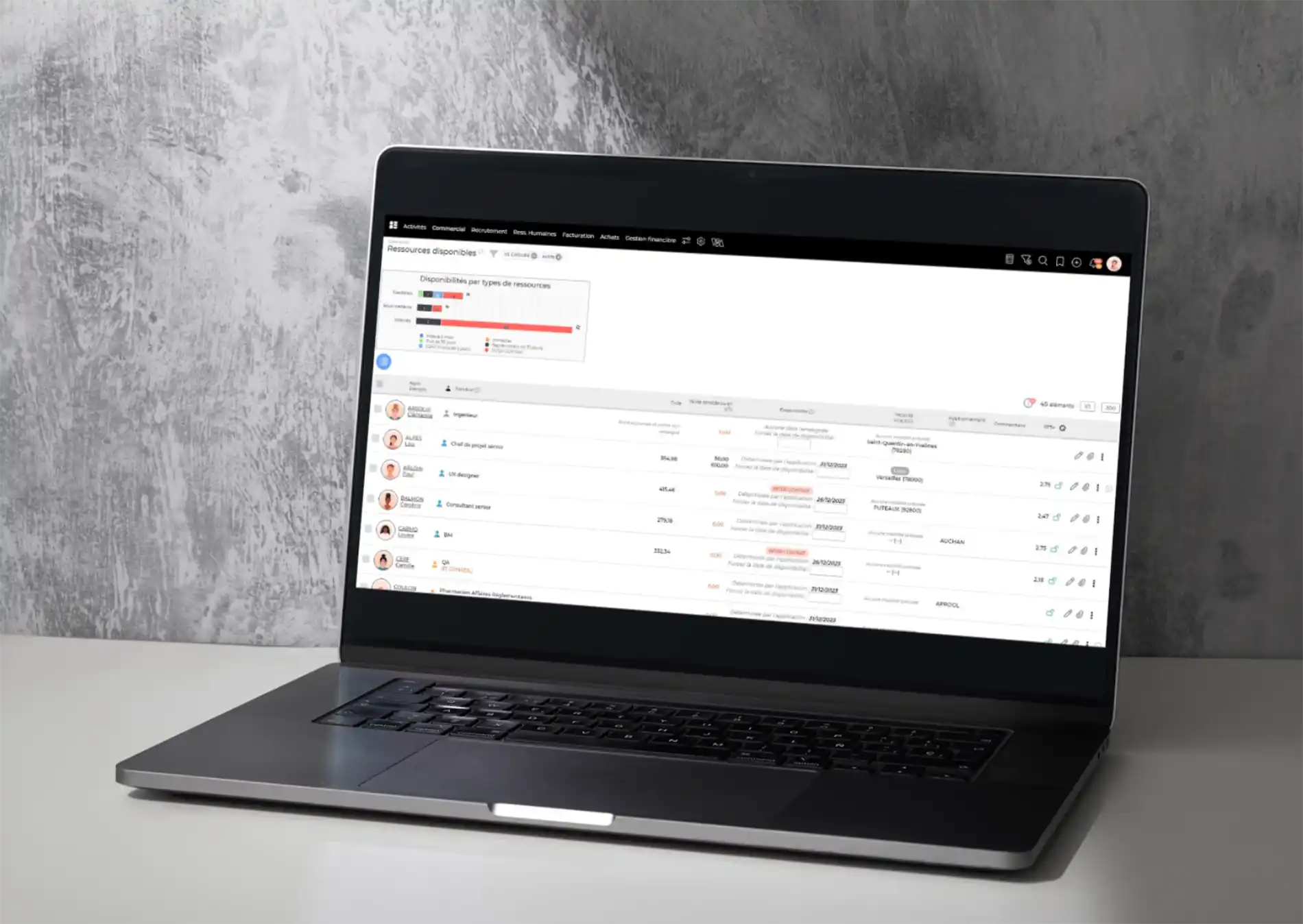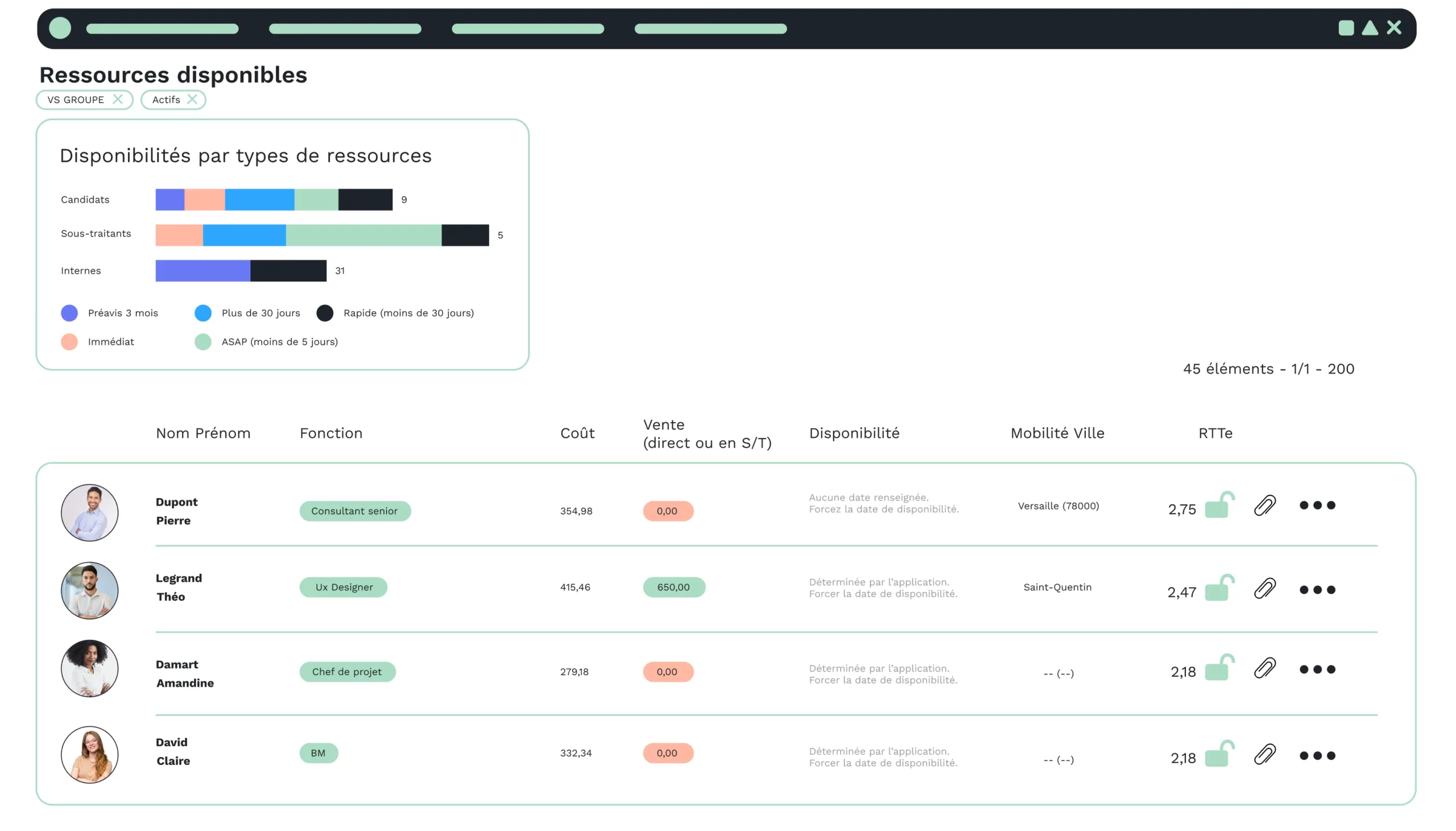Often perceived as complex and costly, ERP software, if properly used and implemented, can cover all the functional needs of an IT services company.
Improving your internal processes, optimizing your costs and standardizing your data are just some of the benefits of this type of software package.
But that’s not all: let’s find out how an ERP system can help you manage your IT services company?
What is enterprise resource planning?
Enterprise Resource Planning / Definition
An enterprise resource planning (ERP) system is a computer application that supports companies in managing their business processes (sales, purchasing, HR, etc.).
This software package, better known as ERP (Enterprise Resource Planning), enables you to manage your company’s activities in a simplified, global way.
Characteristics of a management software package
An enterprise resource planning (ERP) system brings together several applications, known as “modules”, in a single tool.
These modules will share a single common database. They will integrate with each other thanks to this data centralization, but also thanks to a common application interface.
ERP software covers a wide range of functions, including sales management, accounting and customer relationship management.
An ERP can be business-oriented or general-purpose. It can be On-Premise, in the cloud or in SaaS mode.
Example: VSActivity is an integrated management software package for service companies and consulting firms, in SaaS mode.
It features several modules, including CRM, business, purchasing and HR.
Enterprise resource planning / Advantages and disadvantages
Using an integrated software package offers several advantages for a company, such as :
- Optimization of certain costs: for example, tool maintenance, which is carried out by the editor.
- Uniformity and consistency of the information system: as the database is unique, data is reused in several places. There’s no need to re-enter data, which reduces the risk of error and therefore promotes data consistency and uniqueness.
- A single training program: the company will have to train its employees for a single tool.
- Standardization of internal processes: business management software helps standardize internal processes by centralizing settings and thus harmonizing procedures.
- A scalable solution: ERP functionalities are extensive, so a small company that grows will always be able to use it.
But it also has its drawbacks:
- It’s important to have a firm grasp of internal processes: to ensure correct ERP parameterization.
- It’s a project that needs to be meticulously prepared: in particular, data recovery is a crucial stage in getting your data off to a good start.
- Change management: internal reluctance can be your biggest obstacle in deploying the solution.
But you know what they say: for every problem, there’s a solution.
In fact, during an ERP implementation project, you’re not on your own: you can call on the support of the publisher’s consultants, for example.
They will support you throughout the project and advise you on best practices.
The most important thing is to choose the right solution for your needs and your business. To do this, you need to draw up a good ERP specification at the start of your project.
For help on the subject : How do you write the right specifications for an ERP project? + 1 concrete example
As far as change management is concerned, now that you’re aware of what’s at stake, all you need to do is put in place an action plan to make it a success.
IT services company: Managing your business with an ERP or PGI
As mentioned in the introduction, if properly integrated and used, ERP can be a real productivity tool. Here are the arguments.
Several applications in one
Thanks to a single solution, the service company will be able to integrate several tools that will enable better management and monitoring of the company’s activities.
- CRM
- HRIS
- Accounting
- Etc
From these different solutions derive a number of functionalities that are interconnected thanks to the common database.
- Commercial management
- Purchasing management
- HR Management
- Reporting
- Etc
As a result, Digital Enterprise employees and decision-makers can easily find information thanks to this centralization, which also enables data to be consolidated.
Global vision
The information system is harmonized thanks to real-time data synchronization. A single, shared database provides a global view of the company’s activities, enabling it to better manage the flow of information from its various businesses.
More reliable data
Data centralization reduces data entry errors, making the data more reliable. Data loss is also avoided.
What’s more, this means faster decision-making based on real data.
Trade productivity
Information can be accessed quickly and easily.
This reduces processing times and thus delays. Exchanges are more fluid.
What’s more, employees waste less time typing and searching for information, which increases their productivity.
A wide range of reporting tools
Thanks to the business intelligence integrated into the ERP solution, strategy is not left out: with the many reports and indicators on offer, decision-makers can make the right decisions for the company’s growth.
The tool’s graphs and dashboards will also give you better control over your costs.
Improving the employee experience
Integrating such a tool contributes to the employee experience, enabling them to reduce time-consuming tasks and concentrate on higher value-added missions.
The solution also supports your company’s approach to employee experience, thanks to a range of functions for onboarding, mobile employees and much more besides.
Better management of your resources
With this overview, you’ll also be able to optimize your company’s resource planning (human and financial): financial management, personnel management, etc.
To conclude on the usefulness of enterprise resource planning in IT services companies
Enterprise Resource Planning (ERP) is an IT solution that groups together several solutions in the form of modules.
These different modules will enable us to manage and monitor the various activities of an IT services company.
There are several types of software package: specific and generalist; on-premise or in the cloud/SaaS.
Implementing an ERP system within your service company brings benefits such as process optimization, cost reduction and data uniformity and consistency.
However, as with any solution, implementing an ERP also has its drawbacks, which should be kept to a minimum.
Internal processes need to be mastered and, above all, a change management action plan needs to be put in place.
The most important thing to remember is that, once the hurdles have been overcome, Enterprise Resource Planning is a real productivity tool for your digital company.
It enables you to be more responsive, thanks to the reliable, centralized information flows managed by the solution.
Added to this is a global view of the company’s business and an improved employee experience.







